How Cognitive-Behavioral Therapy Helps Manage Triggers and Cravings

Understanding CBT's Impact on Addiction Recovery
Cognitive Behavioral Therapy (CBT) is a staple in addiction treatment, recognized for its structured approach to tackling the psychological components of substance use disorders. This therapeutic method is utilized by the majority of treatment facilities in the US and has proven effective in reducing relapse rates significantly. By targeting the maladaptive thoughts and behaviors that fuel addiction, CBT provides individuals with the skills necessary to navigate the complexities of triggers and cravings. This article delves into how CBT facilitates this process, highlighting its mechanisms, benefits, and impact on long-term recovery.
Mechanisms of CBT in Addiction Treatment
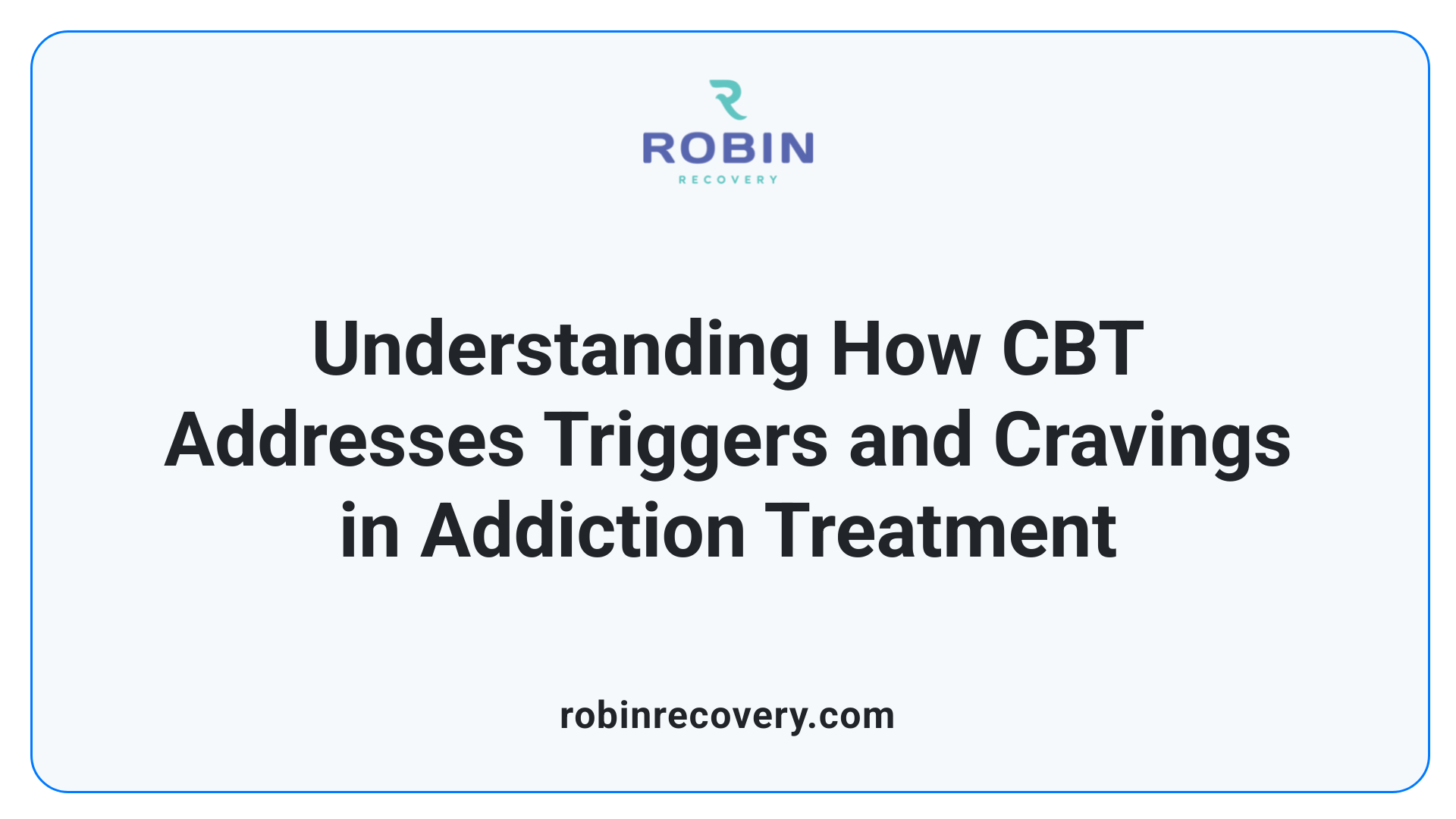
How does cognitive behavioral therapy help with addiction and managing triggers?
Cognitive Behavioral Therapy (CBT) is recognized as a powerful intervention for addiction treatment due to its structured approach to modifying thought processes and behaviors associated with substance use. CBT assists individuals in identifying negative thought patterns and replacing them with healthier, more realistic thoughts. This is essential for managing cravings and triggers effectively.
CBT emphasizes the relationship between thoughts, emotions, and behaviors—helping clients understand how their feelings and environments can evoke cravings. This insight is crucial for developing personalized coping strategies. For example, therapies like cognitive restructuring challenge distorted thoughts while techniques such as relapse prevention plan help individuals identify high-risk situations that may lead to substance use.
Through CBT, clients also learn to recognize and track their triggers—be they situations, emotions, or thoughts—which can incite cravings. This heightened awareness informs their decision-making processes and armors them against relapse. By implementing coping strategies such as distraction, relaxation techniques, and mindfulness, individuals can maintain control over their responses to cravings and manage stress more effectively.
CBT's adaptability compounds its effectiveness; it's often tailored to meet individual needs, making it suitable for various substance use disorders. With approximately 67% of individuals experiencing significant improvements during treatment, it's clear that CBT's holistic approach is instrumental in promoting long-term recovery and emotional regulation.
CBT Strategies in Addiction Recovery
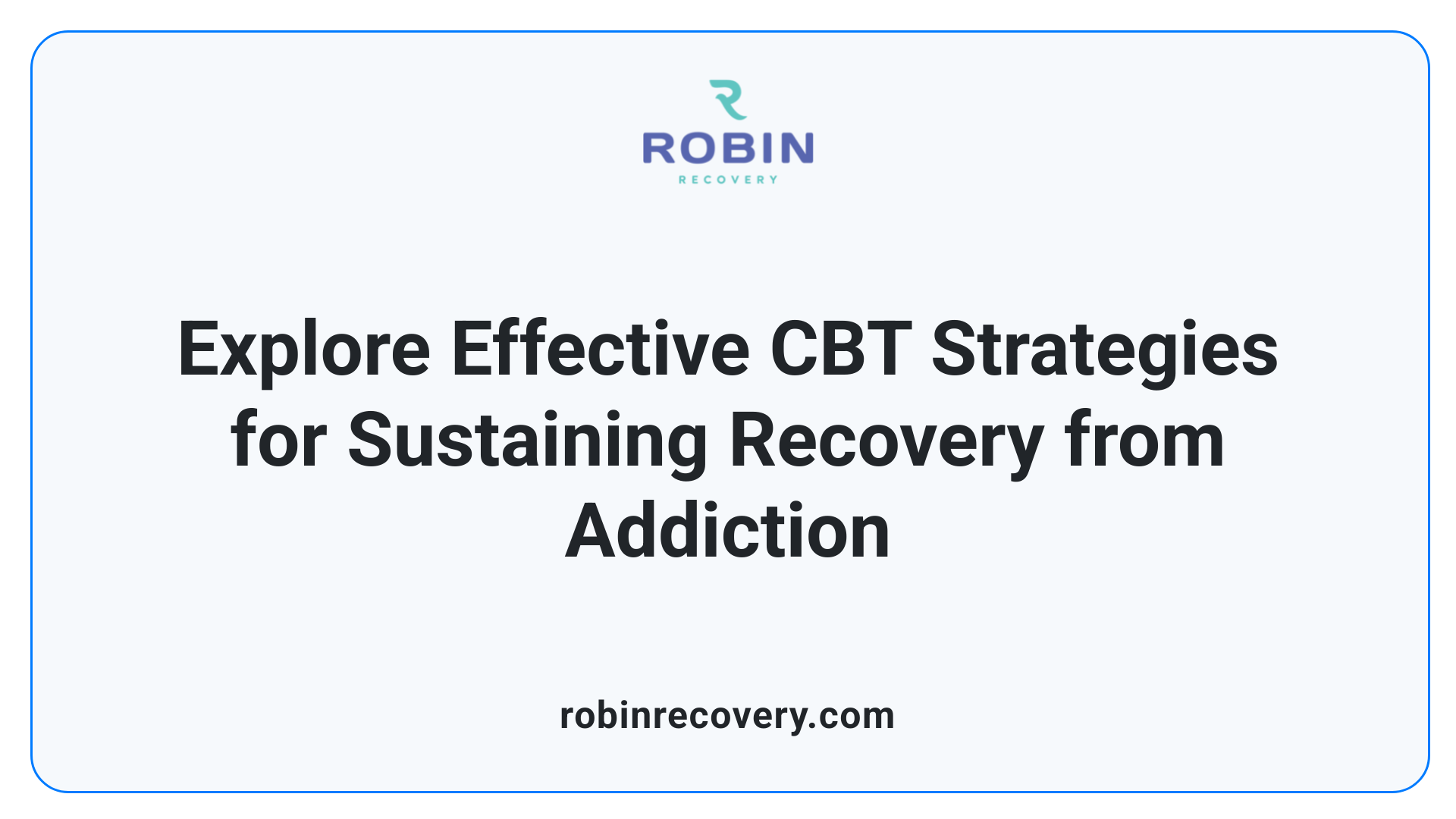
What cognitive behavioral strategies are used in addiction recovery?
Cognitive Behavioral Therapy (CBT) employs various strategies to aid individuals in managing addiction recovery effectively. One fundamental approach is cognitive restructuring, where individuals learn to identify and challenge harmful thought patterns that contribute to substance use. By replacing negative thoughts with balanced ones, individuals can develop healthier coping mechanisms for cravings and triggers.
Additionally, CBT incorporates techniques such as relapse prevention (RP) and skills training to enhance emotional regulation. RP focuses on identifying high-risk situations and developing strategies to avoid them, which is essential in maintaining sobriety over the long term. Through skills training, individuals cultivate practical coping techniques like mindfulness, problem-solving, and stress management, equipping them to handle cravings and avoid relapse.
How do CBT techniques help with stress management?
Stress management is vital in addiction recovery, and CBT offers methods to control stress effectively. Techniques like diaphragmatic breathing, progressive muscle relaxation, and mindfulness meditation are instrumental in reducing anxiety and enhancing emotional stability. These practices enable individuals to manage overwhelming feelings and reactions associated with cravings.
CBT also helps to clarify the nature of stress, identifying objective factors (external pressures), subjective responses (individual perceptions), and interactive components (how one reacts to stress). Understanding these facets equips individuals with the insight needed to develop tailored coping strategies.
How does CBT promote resilience building?
Resilience building is a crucial focus of CBT in addiction recovery. By fostering self-awareness and emotional strength, individuals learn to navigate stressors without resorting to substances. CBT encourages attribution of success to personal efforts rather than external circumstances, which boosts self-efficacy.
Through setting achievable goals and engaging in supportive activities, individuals cultivate resilience against triggers, effectively enabling them to maintain long-term sobriety. The integration of practical skills from CBT not only aids in addressing addiction but also contributes to a more fulfilling, sober life.
CBT Strategy Description Benefits Cognitive Restructuring Identifying and changing negative thoughts Better coping with cravings Relapse Prevention Strategies to avoid high-risk situations Maintains long-term sobriety Stress Management Techniques Breathing exercises, relaxation, mindfulness Reduces anxiety and enhances control Skills Training Problem-solving and emotional regulation Builds resilience
Practical Tools for Managing Cravings
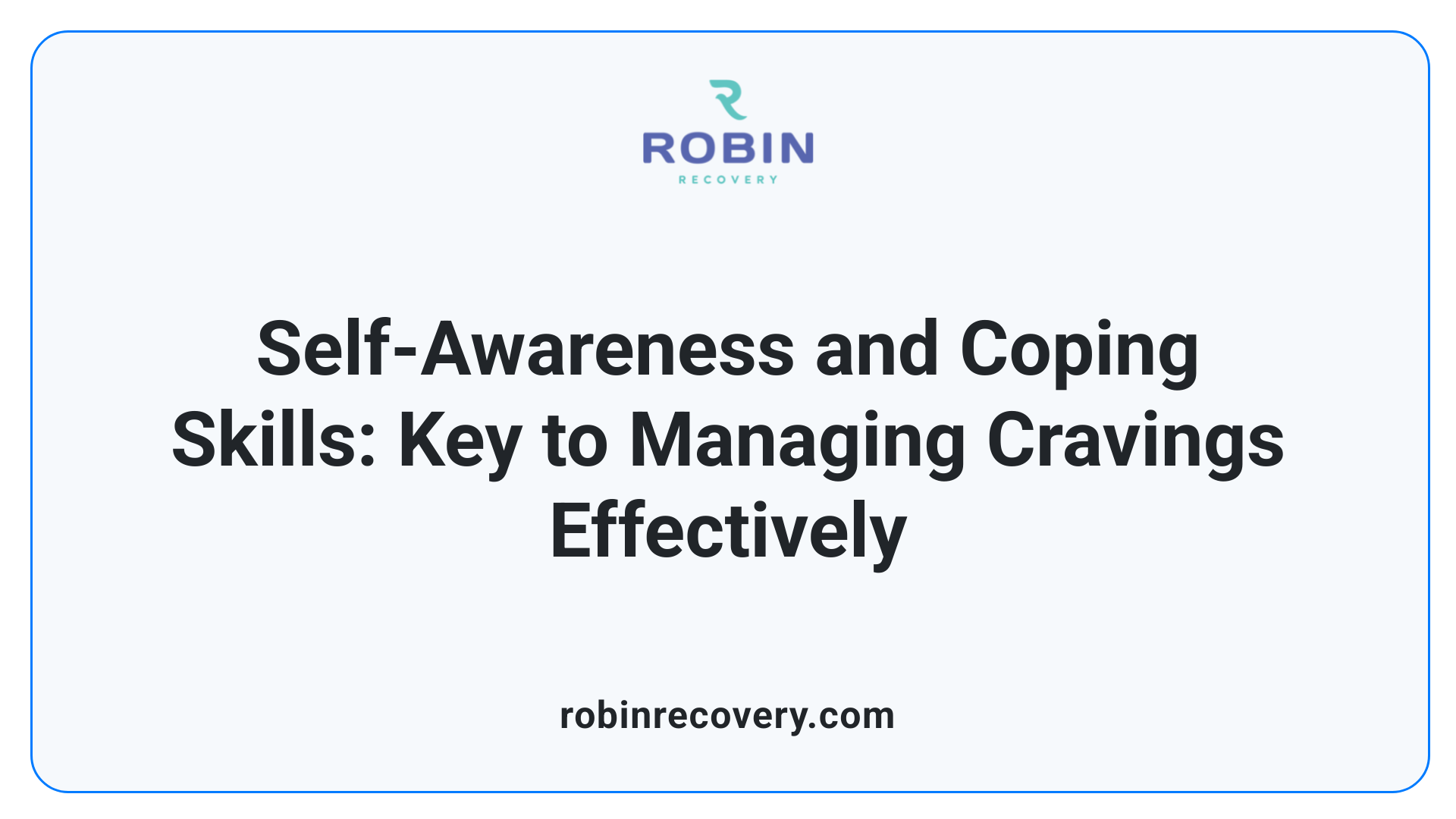
What role does self-awareness play in CBT for addiction?
In CBT for addiction, self-awareness is a critical component as it enables individuals to identify triggers, which encompass situations, emotions, or thoughts that provoke cravings or substance use. This heightened self-awareness allows individuals to manage their responses proactively, aiding in reducing the risk of relapse.
Enhancing Self-awareness
CBT fosters self-awareness by teaching individuals to monitor their thoughts and feelings associated with cravings. This includes recognizing specific triggers and understanding their emotional responses to these triggers. Knowing one’s triggers is essential in developing a tailored strategy to manage cravings effectively. Some techniques include:
- Journaling: Tracking thoughts and feelings to uncover patterns.
- Mindfulness Practices: Encouraging present moment awareness to catch cravings early.
Coping Skills Training
Coping skills training in CBT equips individuals with practical tactics to manage cravings without resorting to substances. Training often focuses on:
- Relaxation Techniques: Methods like deep breathing or progressive muscle relaxation to alleviate anxiety or stress that may lead to cravings.
- Problem-solving Strategies: Encouraging individuals to approach high-risk situations thoughtfully and develop action plans to deal with triggers.
- Distraction Techniques: Engaging in alternative activities to divert attention from cravings, such as exercise or hobbies.
Ultimately, the combination of self-awareness and coping skills training forms a robust framework for effective addiction recovery through CBT.
The Power of Cognitive Restructuring
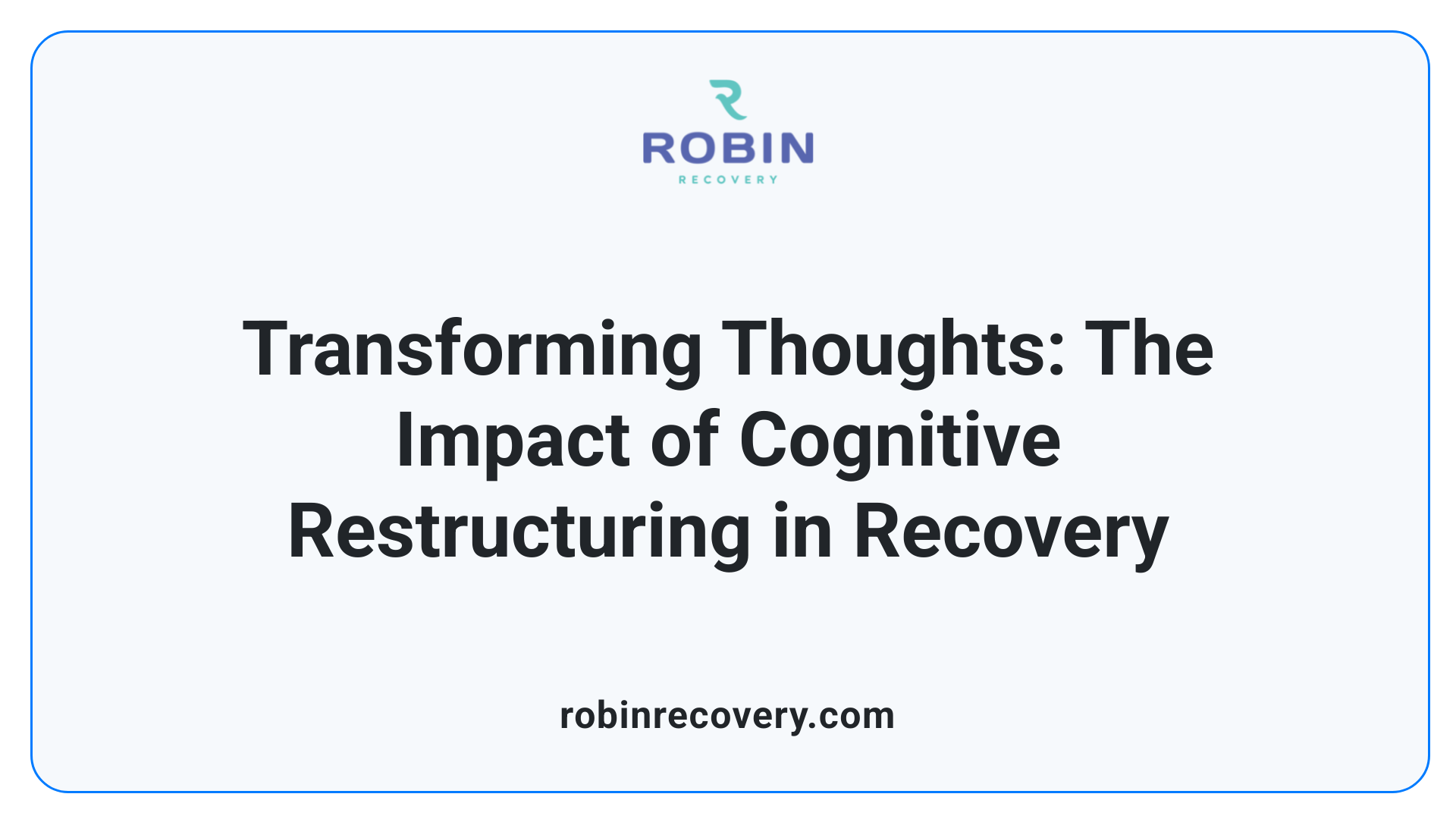
How does cognitive restructuring work in CBT?
Cognitive restructuring is a pivotal technique in Cognitive-Behavioral Therapy (CBT) that empowers individuals dealing with addiction. This method focuses on identifying and challenging distorted or harmful thoughts related to substance use.
Through this process, clients learn to replace negative thoughts with more balanced and realistic ones. For instance, instead of thinking, "I can't handle this stress without using drugs," they might shift to, "I have other ways to cope with stress that don't involve substances."
This shift in mindset is crucial. By altering their thinking patterns, individuals enhance their ability to cope with cravings and triggers effectively. They become more adept at recognizing when certain thoughts arise, which could otherwise lead to relapse.
Cognitive restructuring also contributes to developing healthier coping strategies. Individuals trained in this technique are better equipped to navigate high-risk situations and emotions that may provoke cravings. As they practice these new thoughts, they build resilience and improve their emotional regulation, further reducing the risk of returning to substance use.
In essence, cognitive restructuring not only aids in managing immediate cravings but also fosters a long-term, positive mindset that supports ongoing recovery.
Relapse Prevention and High-Risk Situations
How does CBT aid in relapse prevention?
Cognitive Behavioral Therapy (CBT) plays a pivotal role in relapse prevention by teaching individuals to identify high-risk situations that may lead to substance use. These situations often include specific environments, relationships, or stressful emotions that trigger cravings. By recognizing these triggers, individuals can be better prepared to navigate potential challenges without resorting to substance use.
Identifying high-risk situations
Understanding what constitutes a high-risk situation is crucial for recovery. In CBT, participants learn to classify their triggers as either external or internal:
- External Triggers: People, places, or events that prompt cravings.
- Internal Triggers: Emotions and thoughts, such as anger, anxiety, or stress, that foster a desire to use substances.
This differentiation helps individuals to develop a personalized list of triggers, allowing them to anticipate and prepare for situations that may jeopardize their sobriety.
Developing coping strategies
Once triggers are identified, CBT aids in creating proactive coping strategies. These strategies might include:
- Mindfulness and Relaxation Techniques: Deep breathing or meditation to calm anxiety.
- Problem-Solving Skills: Constructive ways to address stressors without substance use.
- Distraction Techniques: Engaging in hobbies or activities to shift focus away from cravings.
By mastering these techniques, individuals enhance their resilience against relapse, effectively maintaining their recovery journey. With structured planning and continuous self-awareness fostered through CBT, the risk of relapse can be considerably lowered.
Coping with Emotional and Behavioral Patterns
How can CBT modify behavioral patterns?
Cognitive-Behavioral Therapy (CBT) focuses on identifying and altering the behavioral patterns that contribute to substance use. By emphasizing the connection between thoughts, feelings, and actions, CBT helps individuals recognize triggers that lead to cravings or substance use. Techniques such as cognitive restructuring enable individuals to challenge distorted beliefs, while behavioral activation encourages engagement in positive activities that provide fulfillment beyond substance use.
Through these methods, CBT fosters healthier coping strategies. For instance, clients may adopt practices like mindfulness and problem-solving, enhancing their ability to respond to stressors without resorting to substances. This structured approach promotes sustainable behavior change that forms the basis of long-term recovery.
In what ways does CBT promote emotional regulation?
CBT promotes emotional regulation by teaching individuals to recognize and change harmful thought patterns and behaviors that lead to substance use. Techniques such as mindfulness, relaxation exercises, and problem-solving strategies are utilized to handle stress and manage emotions that might otherwise lead to cravings.
For instance, individuals learn to use deep breathing exercises and engage in mindful meditation, fostering emotional stability in moments of distress. This holistic training is crucial, as it equips individuals with practical skills to navigate high-risk situations and recognize feelings that may trigger substance use. Ultimately, this enhanced self-awareness dramatically reduces the risk of relapse and supports the individual's ongoing recovery journey.
CBT’s Role in Long-Term Sobriety
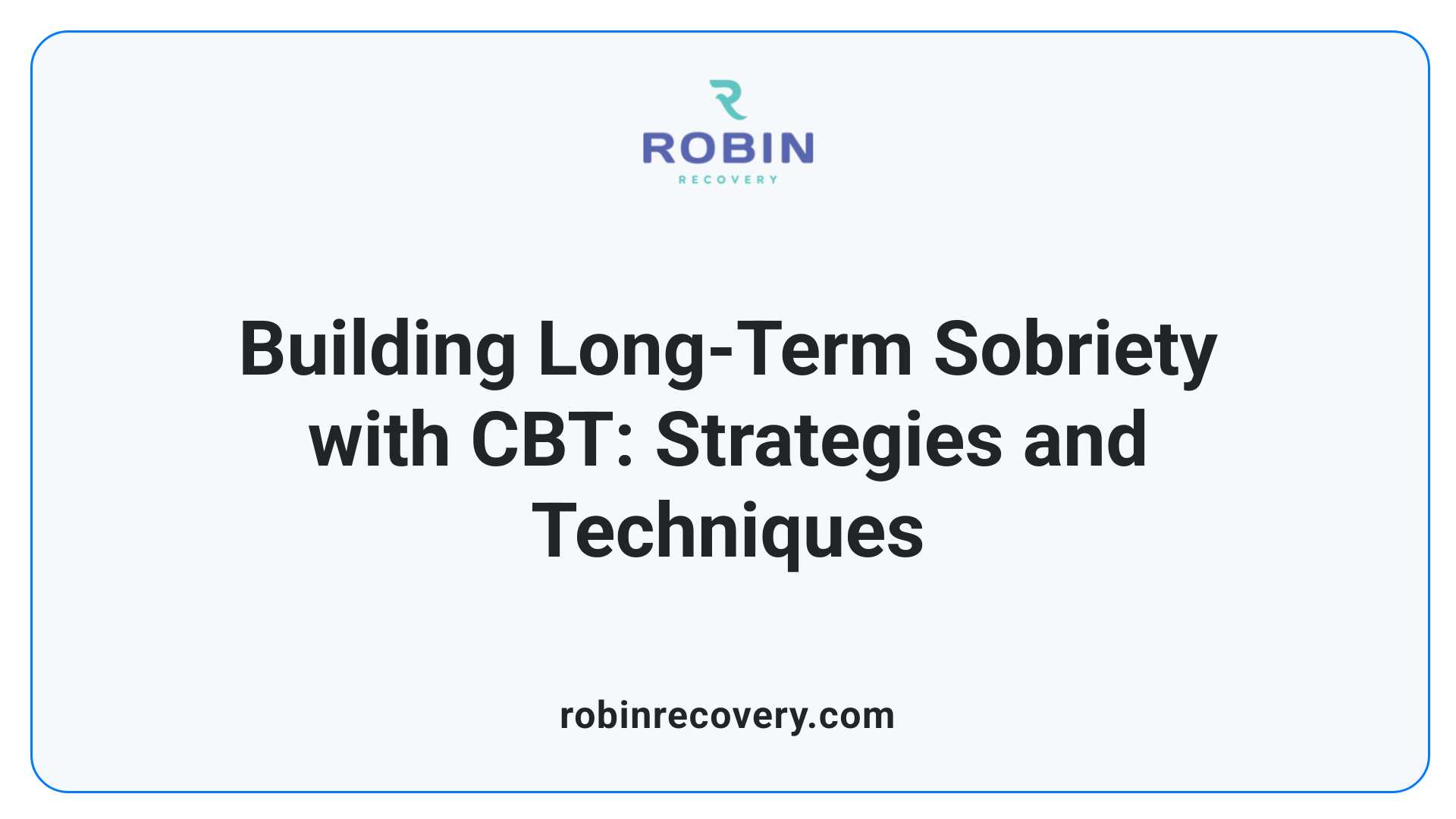
How does CBT contribute to long-term sobriety maintenance?
Cognitive-Behavioral Therapy (CBT) plays a pivotal role in maintaining long-term sobriety by equipping individuals with essential coping skills and strategies. By focusing on self-awareness, CBT helps individuals pinpoint and understand their triggers—these can be specific situations, emotions, or thoughts that provoke cravings for substance use.
Through interventions like cognitive restructuring, clients learn to challenge distorted thoughts that might lead to substance use. This process not only helps in managing cravings but also fosters emotional resilience. As individuals become more aware of their thought patterns and behaviors, they develop healthier coping mechanisms that reinforce their commitment to sobriety.
Sustaining recovery
Techniques such as relapse prevention and coping skills training are fundamental aspects of CBT. They empower individuals to identify high-risk situations and formulate strategies to avoid them. For example, techniques like mindfulness and grounding exercises help in emotional regulation, making it easier to cope with stressors without resorting to substances.
Building resilience
The therapy emphasizes problem-solving skills and realistic goal setting, which are crucial in navigating challenges related to recovery. By encouraging clients to replace harmful habits with positive activities, CBT promotes a healthier lifestyle that supports sustained sobriety. Ultimately, the structured approach of CBT significantly lowers relapse rates, fostering a sense of empowerment and resilience necessary for long-term recovery.
Addressing Co-Occurring Disorders with CBT
How does CBT address co-occurring disorders in addiction treatment?
Cognitive Behavioral Therapy (CBT) plays a vital role in treating co-occurring disorders, combining the treatment of addiction with mental health conditions such as anxiety and depression. This integrated approach ensures that individuals receive comprehensive care that addresses the complex needs associated with both their substance use disorders (SUDs) and any underlying psychiatric issues.
CBT utilizes a holistic framework that intertwines therapeutic strategies for addiction and mental health. Here are some key elements of this approach:
- Integrated Treatment Plans: CBT tailors its strategies to meet the specific challenges of individuals facing both addiction and mental health issues. By focusing on the interrelationship between substance use and mental health, CBT helps individuals understand how their thoughts, feelings, and behaviors are interconnected.
- Addressing Emotional Regulation: Many individuals with SUDs also struggle with emotional regulation. CBT teaches coping strategies to manage negative emotions without resorting to substance use, thus providing tools for better emotional health.
- Enhancing Self-Awareness: By encouraging clients to identify their triggers (e.g., stress or environmental cues), CBT promotes self-awareness, helping clients recognize when they might be at risk for relapse, especially if co-occurring mental health issues are involved.
- Custom Tools and Techniques: Techniques such as cognitive restructuring and mindfulness practices are employed to reinforce positive thought patterns and promote healthier decision-making.
Through this integrated approach, CBT effectively addresses co-occurring disorders, facilitating a more profound recovery experience.
CBT in Treating Adolescent Addiction
What is unique about CBT for teens in addiction recovery?
Cognitive Behavioral Therapy (CBT) addresses the specific challenges faced by adolescents grappling with addiction. It uniquely focuses on identifying and altering negative thought patterns and behaviors common in teens. This tailored approach helps them develop self-awareness about their triggers—situations, emotions, or thoughts that can provoke cravings for substances.
Effective Techniques in Teen CBT
Through CBT, teens learn practical skills to manage their cravings and navigate their triggers without resorting to substance use. Techniques include:
- Cognitive Restructuring: Challenging distorted thoughts and replacing them with realistic ones.
- Relapse Prevention: Identifying high-risk situations and developing coping strategies.
- Coping Skills Training: Equipping teens with stress management and mindfulness techniques to regulate emotions.
- Motivational Interviewing: Enhancing motivation to change behaviors associated with substance use.
Adolescents also benefit from learning relaxation techniques such as deep breathing and mindfulness meditation, which can reduce anxiety and cravings. Additionally, CBT addresses co-occurring mental health disorders, providing integrated support that acknowledges the complex needs of teens during recovery.
Why CBT Works for Teens
Research indicates that approximately 94% of US treatment facilities implement CBT protocols, reflecting its effectiveness.Adolescents undergoing CBT report significant improvements in recovery, showcasing the therapy's role in cultivating long-term sobriety and emotional regulation. Overall, CBT equips teens with valuable tools to overcome addiction, highlighting its importance in adolescent treatment.
Motivational Techniques in CBT
How does motivational interviewing enhance CBT for addiction?
Motivational interviewing (MI) is a powerful component of Cognitive Behavioral Therapy (CBT) specifically tailored for addiction treatment. It plays a critical role by addressing an individual’s motivation for change, which is essential for successful recovery.
MI involves a set of techniques that focus on building confidence in individuals and empowering them to explore their own beliefs about handling cravings and triggers. This is particularly important as many individuals struggling with addiction may grapple with ambivalence about change. By fostering a non-confrontational environment, MI encourages individuals to articulate their reasons for wanting to quit substance use.
Through motivational interviewing, clients develop a stronger commitment to recovery. It enhances their self-efficacy, which is the belief in one’s own ability to succeed in managing cravings and avoiding relapse. With MI, individuals become more engaged in their treatment plan, ultimately leading to more favorable outcomes. This motivational boost not only assists in effective coping strategies during high-risk situations but also reinforces adherence to their recovery goals.
In sum, MI elevates the effectiveness of CBT by nurturing clients' intrinsic motivation to change, enhancing their readiness to confront their addiction challenges.
Evidence Supporting CBT's Efficacy
What evidence exists for CBT's effectiveness in addiction recovery?
Research consistently demonstrates CBT’s effectiveness in reducing relapse rates and facilitating recovery. A notable finding from a 2023 study by Magill indicates that Cognitive-Behavioral Therapy (CBT) is implemented in 94% of US addiction treatment facilities, showcasing its wide acceptance in clinical practice.
Numerous studies highlight the significant impacts of CBT on individuals battling substance use disorders. For instance, CBT has been shown to reduce relapse rates by as much as 60%, according to the Substance Abuse and Mental Health Services Administration (SAMHSA). Furthermore, about 67% of participants undergoing CBT report substantial improvements in their recovery journey, which emphasizes CBT’s crucial role in addiction recovery programs.
Success rates of individuals undergoing CBT
The integration of CBT within treatment frameworks is supported by various therapeutic techniques specifically designed for addiction recovery. These include cognitive restructuring, relapse prevention, and functional analysis. By helping individuals identify triggers and manage cravings effectively, CBT equips them with the skills necessary to maintain sobriety.
Furthermore, CBT’s effectiveness is not limited to individual therapy; it is also instrumental when used in combination with other approaches, enhancing overall treatment outcomes. Individuals report not just improvements in managing their substance use but also boosts in their self-efficacy and coping strategies for handling stressors that could otherwise lead to relapse.
The compelling statistics and ongoing research into CBT's influence on addiction recovery underline its integral place in therapeutic interventions aimed at facilitating sustained recovery.
The Transformative Power of CBT in Addiction Management
Cognitive Behavioral Therapy offers a structured, evidence-based framework for tackling the deeply ingrained thoughts and behaviors associated with addiction. By empowering individuals to identify and manage their triggers, CBT equips them with the necessary tools for a successful and sustained recovery. As a cornerstone in addiction treatment, CBT's adaptability and focus on self-awareness and resilience make it an invaluable tool in the journey toward sobriety and improved mental health.
References
- Cognitive Behavioral Therapy for Addiction: Techniques
- Cognitive-Behavioral Therapy for Substance Use Disorders - PMC
- Cognitive Behavioral Therapy (CBT) For Teen Addiction
- CBT for Substance Abuse in South Padre Island, TX - Origins
- Benefits of CBT for Substance Abuse | Clear Behavioral Health
- Utilizing CBT In Addiction Recovery To Prevent Relapse
- Cognitive Behavioral Therapy (CBT): Definition, Usages, Type ...
